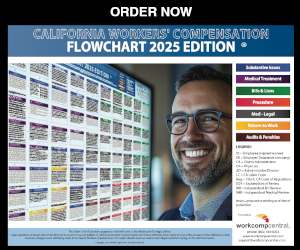Industry Insights
February 7, 2018
Young: Those Magic Words
- State: California
- - 1 share
The term “sudden and extraordinary” might sound like a term suited to describe one of Steph Curry’s game winning 3-pointers or a clutch pass from Tom Brady clinching a comeback win.

Julius Young
But in the California work comp world it’s a vague but critical statutory term that can determine whether an employee of fewer than six months' duration can maintain a compensable psychiatric injury claim.
The term is part of Labor Code 3208.3. Years ago the Legislature was concerned with an explosion of psychiatric stress case filings, and acted in 1989 ,1991 and 1993 to impose limits on psyche claims.
A January 2018 California Court of Appeals decision, State Compensation Insurance Fund v. WCAB (Jose Guzman), provides the latest analysis of what “sudden and extraordinary” means in a legal context.
In Guzman, the injured worker was a construction laborer operating a soil compactor, packing dirt over a newly laid pipe on a hillside. It was a 7-feet long, 45-degree slope. Guzman apparently hit a rock, causing him to fall backwards, resulting in injury when the compactor fell on him.
The physical injury was covered and he had two surgeries. But Guzman’s claim of psyche sequelae from the physical injury was rejected under the six-month rule.
There have been a host of Workers' Compensation Appeals Board panel decisions on the sudden and extraordinary issue. The following is not a comprehensive or exhaustive list, but some examples may be useful in seeing how the WCAB has dealt with the issue.
Cases finding that there was a “sudden and extraordinary” injury:
- Valdez v. Pinnacle Builders (2006). Carpenter was removing nail from a board. The nail popped out of the board, ricocheting into his eye.
- Chapman v. Curran’s Custom Plastering (2007). Plank on scaffold broke, causing worker to plunge to ground.
- Campos v. WCAB (2010). Tree climber/cutter using chainsaw while in harness was hit by piece of tree that broke free.
- Duong v. RGW Construction (2010). Worker on scaffold injured when scaffold fell after a worker on the ground started disassembling it.
- Kurt Jaeger v. Federal Heath Sign Co. (2010). Sign installer injured when an elevated ledge collapsed while he was moving material from ledge to scissor lift.
- Rosa Maria Saavedra V. JLG Harvesting (2011). Lettuce field worker felt stinging sensation in hand and eventually developed inflammation that resulted in amputation. Interestingly, the WCAB panel of Brass, Cuneo and Moresi upheld a WCJ recommendation that “The critical elements in establishing a sudden and extraordinary employment event under Labor Code Section 3208.3 include not only the mechanism of injury but also the circumstances or consequences flowing from the injury.” This decision seems to be an “outlier” in that it introduces the criteria of extent/seriousness of injury into the calculation as to whether it is sudden and extraordinary.
- Docena v. Layne Christensen (2016). Worker injured when cable suspending wrecking ball from crane snapped and he jumped out of the way.
Other panel decisions have determined that the circumstances of injury were not sudden and extraordinary:
- Romero v. CIGA (2005). Fall from a ladder.
- Puga v. WCAB (2007). Fall from ladder while working on ceiling fan.
- Bayanjargal v. WCAB (2006). Slip and fall from a roof.
- Jackson v. City of Los Angeles (2011). Meter maid hit by vehicle while trying to issue citation.
- Mayra Enriquez v. Nouveur (2011). Worker caught hand in sewing machine.
- Jose Cortez Alaniz v. Clearpoint (2011). Workers’ hand pulled into saw as he was grabbing a plank.
- Oscar Pineda v. Magic Fix Auto (2016). Fall from ladder.
But three leading Court of Appeals cases on the subject are examined by the Guzman court in its analysis.
- In Matea v. WCAB (2006), the 6th DCA found that being struck by a rack of falling lumber at a Home Depot store was “sudden and extraordinary” so as to allow a psyche claim for an employee who had worked fewer than six months on the job. The Matea court distinguished sudden and extraordinary events that are uncommon, unusual and totally unexpected from regular and routine employment events that may foreseeably occur.
- But in SCIF v. WCAB (Garcia) (2012), the 2nd DCA found that an avocado picker’s fall from a ladder was not “sudden and extraordinary.”
- And in Travelers Casualty & Surety v. WCAB (Dreher) (2016), the 1st DCA rejected an argument that falling on a rain-slicked concrete walkway was extraordinary.
Putting all this together, the 6th DCA in Guzman finds that Guzman failed to demonstrate a “sudden and extraordinary employment condition.” In the view of the court, he failed to show that hitting a rock with the compactor would be uncommon, unusual and unexpected, so it was not extraordinary that the incident happened. Furthermore, because he had been working on the slope for a half hour, the court did not believe the incident was “sudden.”
While the “extraordinary” aspect of the Guzman incident may be in question where he was working with a compactor, it seems odd that the court questioned the “sudden” aspect. Many injuries occur after a worker has been doing a task for a while, so the finding that it was not “sudden” seems disingenuous where the worker clearly had an eventful thing happen without notice.
If anything, though, a review of these cases shows that they are very fact-dependent. We’ll continue to see litigation over what constitutes “sudden and extraordinary.”
Julius Young is a claimants' attorney for the Boxer & Gerson law firm in Oakland. This column was reprinted with his permission from his blog, www.workerscompzone.com.
Advertisements
Columns
- Kamin: WCIRB Says Carriers Losing Money Due to Rising Costs 07/21/25
- Paduda: What's Happening in Golden State Work Comp? 07/18/25
- CAAA: Fireworks Warehouse Blast Exposes Flaws in Safety, Oversight, Accountability 07/16/25
- Gelman: Asbestos Ban Is a Win for Workers 07/14/25
- Snyder: Mediation Confidentiality 07/11/25
- Snyder: Settle and Sue: Don't Let It Happen to You 07/09/25
- Kamin: State Senate Committee to Consider SIBTF Bill 07/07/25
- Anders: Self vs. Professional MSA Administration: Which Is Right for the Injured Worker? 06/30/25
- Geaney: Court Affirms Finding of Police Officer's Joint Employment 06/27/25
- Fricker: A New Era for Comp Subrogation 06/25/25
- Kamin: AI for HR Equals Bad Injury Reporting 06/20/25
- Montgomery: Will DWC Ignore New Law? 06/18/25
- Kamin: 4th DCA Clarifies DOI From Date of Knowledge 06/16/25
- Wade: Are the Old Ways Gone? 06/13/25
- Snyder: Trust Your Intuition 06/12/25
- Montgomery: DIR Director Reportedly Resigning 06/11/25
- Gelman: Supreme Court to Review COVID Compensability 06/06/25
- Paduda: WCRI's New Studies 06/05/25
- Moore: 187 Pages of WCRI State Stats 06/02/25
- Paduda: The Gutting of NIOSH 05/30/25
Now Trending
- Workers' Compensation News
-
Calif. LAO: Second
Injury Fund 'No Longer Aligned'
With Legislative…
Posted on Jul 14, 2025
-
Calif.
Commissioner Approves 8.7% Rate
Increase, First Since…
Posted on Jul 15, 2025
-
Calif.
Commissioner Says Rate Hike a
Warning of Growing…
Posted on Jul 17, 2025
-
Calif. Jennifer
Osborn Appointed as DIR…
Posted on Jul 18, 2025Jeffrey Gaines says: “Has she ever tried a case at the WCAB?…”
-
Calif. Insurance
Committee Passes Comp…
Posted on Jul 21, 2025
-
Calif. DA
Investigates Alleged Failure to
Protect…
Posted on Jul 21, 2025
-
Calif. QME Exam
Scheduled for…
Posted on Jul 16, 2025
-
Ntl. Lawmakers Ask
GAO to Probe…
Posted on Jul 16, 2025
-
R.I. Split Supreme
Court Upholds Grant of Duty
Disability Pension for State…
Posted on Jul 16, 2025
-
N.Y. Contractor
Sentenced in $1.2 Million Workers'
Comp, Tax Fraud…
Posted on Jul 18, 2025
Jobs
Upcoming Events
Sep 2-4, 2025
San Diego Elevate Workers' Com
We are thrilled to announce that Early Bird registration is OPEN for ELEVATE« 2025! This year's …
Social Media Links
c/o Business Insurance Holdings, Inc.
Greenwich, CT 06836




No Comments
Log in to post a comment